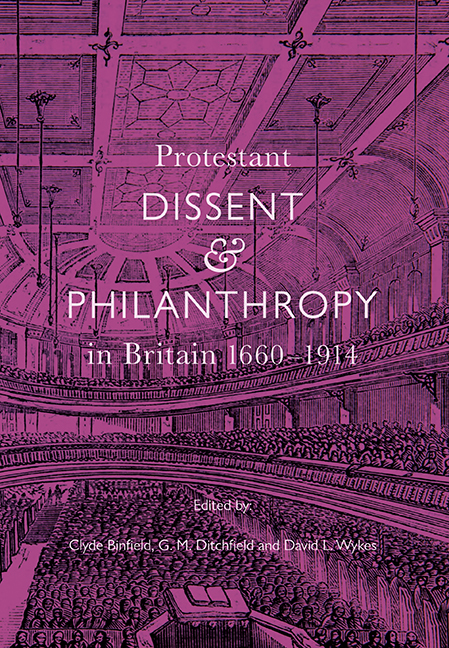Book contents
- Frontmatter
- Dedidcation
- Contents
- List of Illustrations and Tables
- List of Contributors
- Acknowledgements
- List of Abbreviations
- Introduction
- 1 Dissent and Charity, 1660–1720
- 2 Dissenters and Charity Sermons, c. 1700 to 1750
- 3 John Howard, Dissent and the Early Years of Philanthropy in Britain
- 4 Rational Philanthropy: Theory and Practice in the Emergence of British Unitarianism, c. 1750–1820
- 5 David Nasmith (1799–1839), Philanthropy Expressed as Campaigning
- 6 Building Philanthropy: The Example of Joshua Wilson (1795–1874)
- 7 Funding Faith: Early Victorian Wesleyan Philanthropy
- 8 Unitarians and Philanthropy After 1844: the Formation of a Denominational Identity
- 9 Children and Orphans: Some Nonconformist Responses to the Vulnerable in Victorian Britain
- 10 The Rowntree Family and the Evolution of Quaker Philanthropy, c. 1880 to c. 1920
- 11 ‘Not slothful in business’: Enriqueta Rylands and the John Rylands Library
- Select Bibliography
- Index
- STUDIES IN MODERN BRITISH RELIGIOUS HISTORY
1 - Dissent and Charity, 1660–1720
Published online by Cambridge University Press: 21 March 2020
- Frontmatter
- Dedidcation
- Contents
- List of Illustrations and Tables
- List of Contributors
- Acknowledgements
- List of Abbreviations
- Introduction
- 1 Dissent and Charity, 1660–1720
- 2 Dissenters and Charity Sermons, c. 1700 to 1750
- 3 John Howard, Dissent and the Early Years of Philanthropy in Britain
- 4 Rational Philanthropy: Theory and Practice in the Emergence of British Unitarianism, c. 1750–1820
- 5 David Nasmith (1799–1839), Philanthropy Expressed as Campaigning
- 6 Building Philanthropy: The Example of Joshua Wilson (1795–1874)
- 7 Funding Faith: Early Victorian Wesleyan Philanthropy
- 8 Unitarians and Philanthropy After 1844: the Formation of a Denominational Identity
- 9 Children and Orphans: Some Nonconformist Responses to the Vulnerable in Victorian Britain
- 10 The Rowntree Family and the Evolution of Quaker Philanthropy, c. 1880 to c. 1920
- 11 ‘Not slothful in business’: Enriqueta Rylands and the John Rylands Library
- Select Bibliography
- Index
- STUDIES IN MODERN BRITISH RELIGIOUS HISTORY
Summary
The subject of Dissent and charity has received surprisingly little attention from historians for the period 1660–1720. Although there are individual studies of a number of major Dissenting charities established in this period, there has been no attempt to consider the importance of charity to Dissent, particularly in support of the ejected ministers, or later in funding ministers and meetings. Historians have also failed to examine the forms it took, the denominational distinctions, or how Dissenting charity differed from that given to the Church of England. Nor has the wider charity of Dissenters, to relieve the poor generally or to promote religion by encouraging literacy and supplying bibles and copies of other texts, been much considered. The major charities established for the benefit of Dissent, particularly after toleration, were important and helped shape Dissent, but there were many individuals at the local level who supported their minister and meeting though in much more modest and informal ways. Without this large-scale support Dissent could not have survived the period after 1662, let alone developed and expanded in the decades following toleration. Dissenting charity in this period covered three main areas: first and foremost the support and encouragement of religion (especially the support of ministers and meetings), education, and the relief of poverty. This chapter will examine the extent, nature and importance of charity in the development of Dissent for the first two generations after 1660. The Toleration Act (1689) proved to be a crucial watershed. The change in the legal status of Dissent led to the rapid expansion of meetings and to new and more organised forms of charity.
Charity and the ejected ministers
Between 1660 and 1662 a great many ministers gave up their livings and, by surrendering the vicarage or rectory, their homes, for the uncertainty of nonconformity. Edmund Calamy's accounts of the ejected ministers reveal that 100 or so had considerable private means, and perhaps another 100 at some point kept a school, while about 60 practised medicine, and 20 took up trade or farming. The majority of the remainder if they did not retire from ministry continued to depend upon preaching for their livelihood.2 About fifty were fortunate to be appointed as chaplains or tutors in the households of the peerage or gentry, but most had to rely on private charity.
- Type
- Chapter
- Information
- Publisher: Boydell & BrewerPrint publication year: 2020



